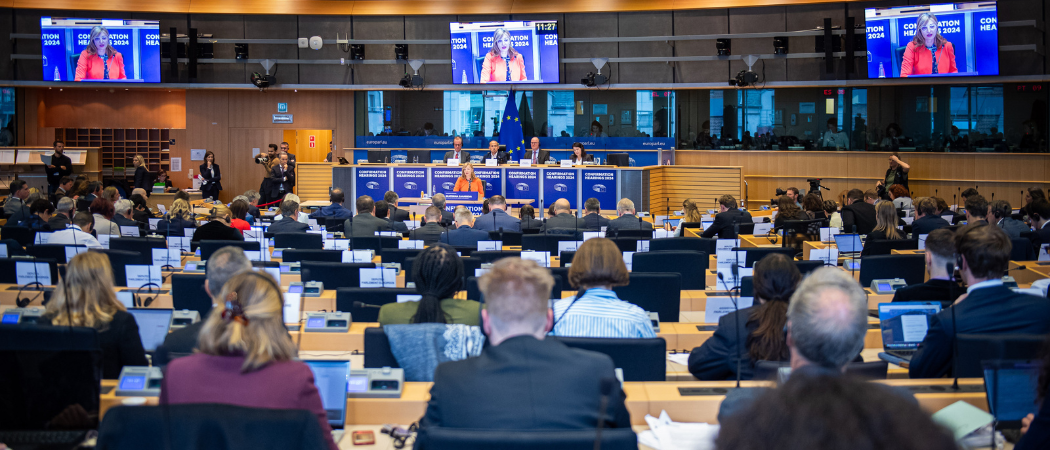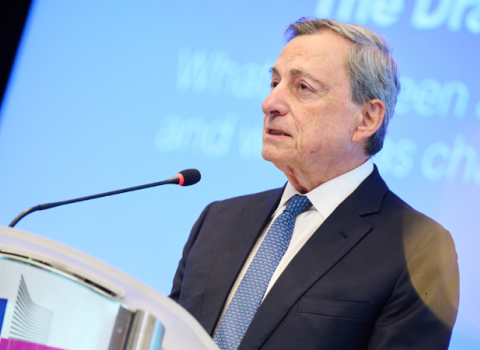Commissioner-designate seen as advocate for more independence in EU research programming and a strong voice for increasing R&I investment

MEPs questioning Ekaterina Zaharieva, commissioner-designate for start-ups, research and innovation, during her confirmation hearing at the European Parliament in Brussels. Photo credits: Lukasz Kobus / European Union
New research commissioner Ekaterina Zaharieva passed the test at the European Parliament’s hearing on Tuesday morning, at least in the eyes of the Brussels’ research stakeholders. However, questions on how she views the practicalities of organising FP10 remain.
“She has done a solid interview and addressed the tasks set out in her mission letter in a clear and convincing way,” said Robert-Jan Smits, president of the executive board of the Eindhoven University of Technology. On a scale of one to ten, he gave her a seven.
Christian Ehler, member of the European Parliament and Zaharieva’s fellow member of the European People’s Party, was happy with her performance. “She stood up for a strong budget, and that will be the main issue for the next term,” Ehler told Science|Business.
He praised Zaharieva for straying from the usual Commission line by advocating for independence for EU agencies, such as the European Innovation Council (EIC), which funds start-ups.
“I think that we saw very personal handwriting that was not just the usual Commission preparation, when she had been advocating a certain self-independence, for example, of the agencies, to get the stakeholders in having more self-governance,” said Ehler.
The Parliament’s Industry, Research and Energy (ITRE), which held the hearing, has since voted in favour of Zaharieva’s appointment. If all goes well, she will be confirmed in a Parliament plenary vote later this month.
An independent Pillar II
Independence is a key issue for the European Innovation Council (EIC), which Ehler hopes to see moved from under the European Commissio’s wing to be able to operate less bureaucratically. But autonomy from the Commission may also be on the cards for other research programmes.
One key battle for Zaharieva to steer in the coming years will be over how to fund big collaborative research calls in the EU budget. In Horizon Europe, these are organised under Pillar II and programmed by the European Commission with input from EU member states. But recent high-level policy reports have proposed they should be steered by independent councils.
In her hearing, Zaharieva did not reference the proposals directly but called for “decentralisation in Pillar II and Pillar III” of Horizon Europe, taking the “good example” of the European Research Council (ERC), which is already run by an independent council of scientists.
A de-centralised Pillar II would see more active involvement from the private sector, likely with less influence from the member states in shaping the work programmes.
The shape of Pillar II and its governance will be a key battleground in the coming months. Dan Andrée, who represents the University Alliance Stockholm Trio in Brussels, says it’s important for big collaborative projects to remain at the heart of the next EU research Framework Programme, FP10. While the ERC (Pilar I) and EIC (Pillar III) can be independent, Pillar II cannot simply be governed by a council.
“You can’t set up a council to implement Pillar II, it is much more complicated,” he says. He believes what Europe needs is a Framework Programme focused on pre-competitive collaboration in areas contributing to the goals of the EU. To run it, the Commission needs an advisory board with industry and other stakeholders, Andrée said.
And it should be a simpler, more focused programme, with fewer policy goals. “The member states should accept not to use the programme committees to add so many details,” said Andrée.
The call for fewer policy prescriptions echoes Zaharieva’s comments at the hearing. “We have six clusters in Pillar II, but in reality, it’s more than 15 priorities. In my view, if we have 15 priorities, in reality we have zero priorities,” she told MEPs.
A ringfenced programme?
But the three-hour hearing sectioned into two-minute answers did not afford enough space for in-depth answers to some questions.
Kurt Deketelaere, secretary general of the League of European Research Universities (LERU), said Zaharieva was well-prepared and rated her performance well.
He was disappointed Zaharieva did not bite when asked about the rumours that the next EU Framework Programme, FP10, might be absorbed by an overarching Competitiveness Fund. A leaked internal Commission memo last month revealed plans to incorporate Pillar II, alongside the rest of Horizon Europe and other EU programmes, into a giant EU competitiveness fund.
“[MEP Christian] Ehler was hinting at a possible disappearance of the FP [Framework Programme] or its inclusion in the European Competitiveness Fund, but she avoided to say something on that, and unfortunately nobody picked up on this,” said Deketelaere.
He hopes MEPs will challenge vice president-designate Stéphane Séjourné, who will act as Zaharieva’s boss if confirmed, to answer the question at his hearing next week.
The big worry for universities is that if the programme is absorbed by a bigger competitiveness fund it would be geared at innovation close to the market, undermining earlier stage research projects. This ties in with the Pillar II governance question. If Pillar II is decentralised and part of a bigger fund, research stakeholders will have less steer in how the calls for funding are programmed.
But not all are concerned. Smits says that even if she did not specifically mention a ringfenced EU FP10 programme, its existence is enshrined in the Treaties and thus protected.
If FP10 is part of a bigger fund, “one needs to take care that not everything is then about near market and high TRL [technology readiness level] related activities,” said Smits. “There always should be room for frontier research type of projects (read: ERC), which are not about immediate impact or high TRLs but provide the basis for groundbreaking innovations and inventions.”
But Smits hopes that if Zaharieva fails to defend early stage and frontier research in the Commission, Christian Ehler in the European Parliament will step in.
A good score overall
Big changes await the next big EU research framework, due to start in 2028. Whatever its shape, the research community is confident Zaharieva will be a strong advocate for a strong budget and framework for R&I.
Her commitment to a strong research budget was clear. Thomas Jørgensen, director at the European University Association (EUA), said “she sent a clear signal to MEPs and member states about the importance of R&I investment and warned against using FP10 as a savings account for other emerging priorities.”
Mattias Björnmalm, secretary general of the university association CESAER, was impressed with Zaharieva’s commitment to an ambitious European R&I agenda, as well as her willingness to go beyond pre-prepared answers.
“I also think she did well when it was obvious that she went beyond what had been prepared for her by the Commission services, for example in answer to specific questions from MEPs, which bodes well for the future,” Björnmalm said.
Zaharieva also has the support of Manuel Heitor, former Portuguese research minister and leader of the independent group that produced the landmark report on FP10.
“Based on my own experience to discuss last week with the candidate Zaharieva the key critical issues for Europe, it is very clear that she is very well prepared and clearly understands the opportunities and challenges for research, technology and innovation in Europe,” he told Science|Business.
Ringfencing the EU budget is the biggest worry for the near future, but there are plenty of other topics on which stakeholders want to hear more from Zaharieva.
For one, universities are awaiting details on her plans for the European Research Area (ERA) Act. Commission President Ursula von der Leyen set out a plan to propose the Act in Zaharieva’s mission letter, a to-do list for her term, if confirmed.
The act would guarantee the free movement of researchers, knowledge and technology in the EU. But the Commission has tried it before, but convincing member states to sign up has proved to be politically challenging.
“We would like to hear more about her views on a future ERA Act, in particular on how this would make a tangible difference for universities and researchers, as this is not the first time that the EU has attempted to address these issues,” said Jørgensen from the EUA.





 A unique international forum for public research organisations and companies to connect their external engagement with strategic interests around their R&D system.
A unique international forum for public research organisations and companies to connect their external engagement with strategic interests around their R&D system.